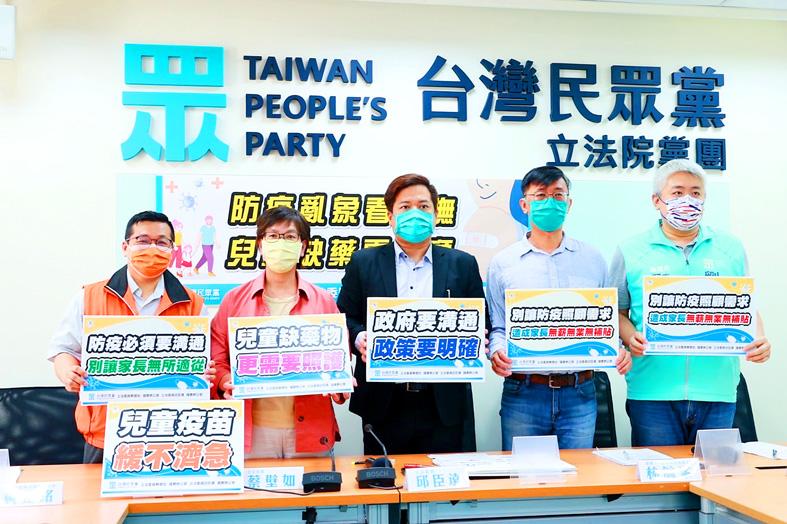The Taiwan People’s Party (TPP) caucus yesterday called for better vaccine information and subsidies for lost work to help children and parents weather a worsening outbreak of COVID-19.
As the domestic case count leapt to 8,822 yesterday, the TPP caucus said there were “oversights” in government policy regarding children.
TPP caucus whip Chiu Chen-yuan (邱臣遠) called for transparency on vaccines, starting with information on the side effects of the Moderna vaccine in children.

Photo courtesy of the TPP
The Ministry of Health and Welfare should also publicize its plan to purchase Pfizer-BioNTech for children — including an expected timeline and amount — to help parents make an informed decision on which vaccine to choose, he added.
The caucus also questioned the government’s “3+4” isolation policy, which allows people to return to work on the fourth day if they test negative.
Under this scheme, parents of young children would have to return to work while their child remains at home, Chiu said.
If a child is under isolation as a close contact, but does not yet have an official notice to prove it, their parent cannot apply for a subsidy to supplement missed income, he said.
Schools should also be given subsidies to purchase all necessary equipment, especially rapid tests for unvaccinated students to take free of charge, he added.
Questioning the government’s caregiving guidelines for moderate or severe COVID-19 patients, which recommends the use of dexamethasone, TPP Legislator Tsai Pi-ru (蔡壁如) said there are no clinical studies proving its efficacy in children younger than 18.
On the other hand, Pfizer’s Paxlovid antiviral therapy has been recommended for patients older than 12, she said, adding that children are being overlooked in regard to medication as well as vaccines.
Children who have not tested positive need proper protection, while those who have need proper care, Tsai said, calling for better communication on what to do when classes are canceled or parents must take caregiving leave.
Parents are facing three main difficulties, National Alliance of Presidents of Parents’ Associations board member Huang Cheng-ming (黃正銘) said.
First are differences in the central and local governments’ school closure policies, which have been further complicated by the “3+4” scheme, leaving parents unsure which rules to follow, he said.
Second is vaccine information, he said.
Not knowing when the Pfizer-BioNTech vaccine might become available, parents cannot make a decision on which type of vaccine to choose for their child, he said.
The last particularly affects parents working as teachers, who need guidance on what to do if caregiving duties conflict with work, he added.
Separately yesterday, Deputy Minister of Health and Welfare Hsueh Jui-yuan (薛瑞元) said a deal on Taiwan’s planned purchase of Pfizer-BioNTech COVID-19 vaccines, which would include child versions, was expected to be signed “this week,” although he did not elaborate on the details.
Taiwan “should be able to sign a deal this week,” Hsueh told a meeting of the legislature’s Culture and Education Committee.
He did not say how many of the vaccines would be the version for children, and when they were expected to arrive.
Asked about the low willingness of parents to have their children vaccinated, Hsueh said the ministry would try its best to provide sufficient information to parents so that they would not base their decision “on emotions.”
Additional reporting by CNA

Nipah virus infection is to be officially listed as a category 5 notifiable infectious disease in Taiwan in March, while clinical treatment guidelines are being formulated, the Centers for Disease Control (CDC) said yesterday. With Nipah infections being reported in other countries and considering its relatively high fatality rate, the centers on Jan. 16 announced that it would be listed as a notifiable infectious disease to bolster the nation’s systematic early warning system and increase public awareness, the CDC said. Bangladesh reported four fatal cases last year in separate districts, with three linked to raw date palm sap consumption, CDC Epidemic Intelligence

The manufacture of the remaining 28 M1A2T Abrams tanks Taiwan purchased from the US has recently been completed, and they are expected to be delivered within the next one to two months, a source said yesterday. The Ministry of National Defense is arranging cargo ships to transport the tanks to Taiwan as soon as possible, said the source, who is familiar with the matter. The estimated arrival time ranges from late this month to early next month, the source said. The 28 Abrams tanks make up the third and final batch of a total of 108 tanks, valued at about NT$40.5 billion

Two Taiwanese prosecutors were questioned by Chinese security personnel at their hotel during a trip to China’s Henan Province this month, the Mainland Affairs Council (MAC) said yesterday. The officers had personal information on the prosecutors, including “when they were assigned to their posts, their work locations and job titles,” MAC Deputy Minister and spokesman Liang Wen-chieh (梁文傑) said. On top of asking about their agencies and positions, the officers also questioned the prosecutors about the Cross-Strait Joint Crime-Fighting and Judicial Mutual Assistance Agreement, a pact that serves as the framework for Taiwan-China cooperation on combating crime and providing judicial assistance, Liang

A group from the Taiwanese Designers in Australia association yesterday represented Taiwan at the Midsumma Pride March in Melbourne. The march, held in the St. Kilda suburb, is the city’s largest LGBTQIA+ parade and the flagship event of the annual Midsumma Festival. It attracted more than 45,000 spectators who supported the 400 groups and 10,000 marchers that participated this year, the association said. Taiwanese Designers said they organized a team to march for Taiwan this year, joining politicians, government agencies, professionals and community organizations in showing support for LGBTQIA+ people and diverse communities. As the first country in Asia to legalize same-sex